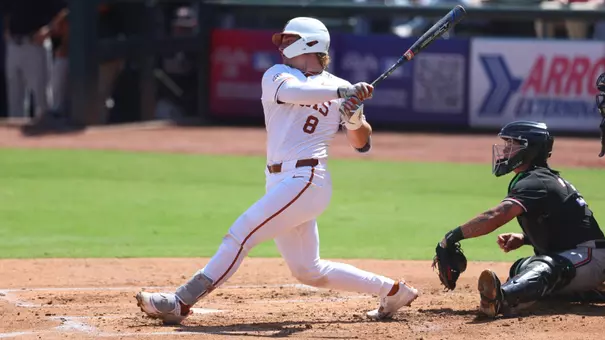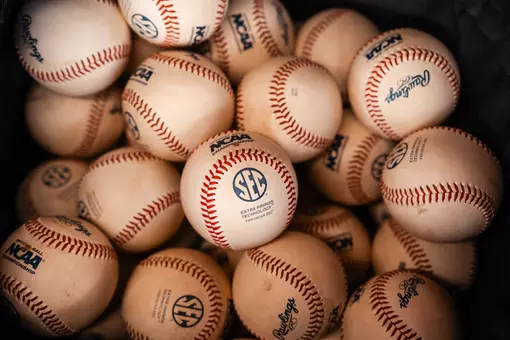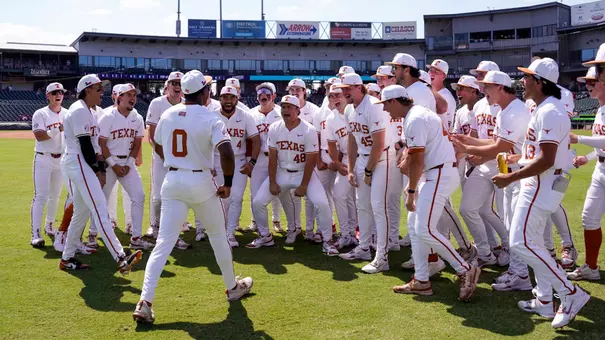The University of Texas at Austin Athletics
Bill Little Commentary: The return of the Horns
06.23.2014 | Baseball, Bill Little Commentary
As the final curtain came down for 2014 Texas Baseball, eliminated from the CWS in the championship game of what was called "bracket one," it wasn't about what they had lost. It was about what they had won.
Bill Little, Texas Media Relations
As the final curtain came down for the 2014 Texas Longhorns, eliminated from the College World Series in the championship game of what was called "bracket one," it wasn't about what they had lost. It was about what they had won.
A team that came from nowhere in its own conference according to pre-season prognosticators left Omaha as the bronze trophy winner as the third place team in the tournament, forced from the CWS by Vanderbilt in a 10th inning that included the longest out and the shortest base hit in this year's eight-team classic, 4-3. The Horns had beaten Vandy, 4-0, the day before to force the championship game. Saturday, they were only an out or a hit away from reaching their goal of playing Virginia for the National Championship in a best-of-three series that begins Monday.
They had fought to the last play, a weak ground ball with the bases loaded (which barely cleared the mound area sixty feet from home) that went for a base hit as a charging C. J Hinojosa somehow managed to actually turn it into a close play at first base.
In the top of the 10th, with the scored tied at three, Hinojosa had launched a deep drive to the wall in right center field. For a moment, it appeared that the Longhorns were about to take Augie Garrido to the CWS championship competition for an amazing fifth decade in a row. But a dramatic catch robbed them of that chance.
"I'm sorry I am late," said Garrido as he sat down for the Longhorns' final press conference following the game, "but I have 27 kids in there who have broken hearts, and I needed to talk to them."
Tucked inside the visitors' locker room, and later on a short ride back to the team hotel a couple of blocks away from TD Ameritrade Field, the team that everybody had come to love was crushed. They cried, not because they lost a game, but because there were no more games to play together.
This is the story of the 2014 Texas Longhorns.
It actually begins a year before, when the Longhorns had ended their season in last place in their conference. Nathan Thornhill had pitched Texas to victory that final day at TCU, and he stood in front of the dugout, talking in a radio interview about the future of the team, and how next year, "this team" would be better. It appeared, for all the world, that he had decided to try his hand at professional baseball.
As the media quizzed Garrido about the comparisons with the 1956 Longhorn team—the last time Texas had finished at the bottom, when the interview was over, he turned, and then said, "let me ask a question.
What happened the next year?"
Scouring the record books, the answer came and a call was placed to the Texas bus on its journey toward Austin.
"The answer to that question? They finished 20-7 and went to Omaha."
"That," said Garrido, "is what I wanted to hear."
That was the beginning. Thornhill and leading hitter Mark Payton both chose to return to school for their senior year. Fall practice was rugged, as Texas shed the mantra of "We used to be Texas," and set about restoring the program to its rightful place on the nation's college baseball landscape.
To do it, each player had to buy in, to accept his role as a talented group of freshmen joined the returning upper classmen. Catcher Jacob Felts and first baseman Alex Silver maintained positive attitudes as freshmen supplanted them in the lineup. Madison Carter and Weston Hall, two junior college transfers who had played regularly in 2013, kept upbeat attitudes for the good of the team. Carter, in fact, stepped in midway through the conference season and became one of the squad's leading hitters when opportunity came his way in a series at Texas Tech.
Perhaps it is trite to say they became a "band of brothers," but that is what they did. An outfield that included Payton, raw but highly talented Ben Johnson and emerging junior Colin Shaw became "the sharks" who ran down almost everything in the outfield.
Second baseman Brooks Marlow was so good defensively he earned a Rawlings Gold Glove, and shortstop Hinojosa blossomed to merely spectacular by the NCAA playoffs. The final pieces of the puzzle came from three true freshmen, in catcher Tres Barrera, third baseman Zane Gurwitz, and first baseman Kacy Clemens.
The batting order shifted from time to time, but the core of the nine position players and the DH role remained the same for most of the season.
If the outfielders were the sharks, the infielders and Barrera were the "bandits," robbing opponents time after time. And the pitching staff was the "tip of the spear."
Dillon Peters, Parker French and Thornhill started the rotation, with Lukas Schiraldi a steady hand as a starter in the midweek games. Ty Marlow, who was in competition to be the team's closer, went down with injury at the beginning of the season, forcing pitching coach Skip Johnson to recreate the role in a rotation that included everybody from Thornhill to a rehabilitated John Curtiss.
When an elbow injury ended Peters' season at the end of Big 12 competition, Chad Hollingsworth moved from the bullpen duties he had shared in middle inning relief with freshman Morgan Cooper, and lefthanders Travis Duke and Ty Culbreth to become a starter. Pitching brilliantly in that role in the NCAA regional and the CWS, he quickly became another emerging star.
Meanwhile, Garrido and his staff of full-time assistants Skip Johnson and Tommy Nicholson, volunteer coach Ryan Russ and the rest of the support staff had settled into their second year together with tremendous stability both on the coaching and the recruiting fronts.
From the time youngsters first pick up a bat and toss a ball, baseball often seems destined to be a team game made up of individual interests. This remarkable team checked its egos at the door. That is how, game after game, a different player always seemed to shine. Payton's amazing streak of reaching base 101 times certainly contributed mightily, but up and down the lineup, back and forth from the mound and the bullpen, stars seemed to align together.
Folks came to love this team for its spirit. It was never perfect, but it was perfect in its imperfection. Most of all, it had heart. From bullpen catchers such as Grant Martin and James Barton to the student managers and trainers and staff, this became a team with a common purpose. More than winning itself, it bought in and went all in for the purpose of team, togetherness, and an innate love of the game.
In an age where teams seem to be like sky rockets—blazing to the top and then fading—Texas has remained the constant. Its 35 College World Series appearances far exceeds its next closest competitor for the "most ever"—Miami with 23. The third place finish marks the 27th time Texas has finished in the Final Four in the CWS. Texas has played in a dozen championships games, finishing first six times and second six. As the legendary dynasties have fallen away in a scholarship-challenged environment (with only 11.7 scholarships in baseball) which seems to mandate parity, the Longhorns live in a world where missing Omaha for a couple of years is considered an upset of major proportions.
It should not be lost that Garrido in the postgame press conference said he thought that this 2014 team was the best Texas team since its 2005 National Champion. That is not to dismiss the 2009 runners-up, or the 2010 team which was knocked out as the nation's No. 1 seed in a Super Regional in Austin.
In the formative years of the lives of the current college freshmen, Huston Street was pitching Texas to the CWS championship when they were six and seven. By the time they were ten and eleven, Texas was winning the series again in 2005.
All of that we know. What we also know is that the spirit and tradition of Texas baseball, which this team has restored, is one of continuity. This is a team which has done things right, on the field, in the classroom, and in the community.
Success is contagious, and it expected. In the early 2000s, Texas was a base hit away from beating Stanford in 2001 that would have meant the Longhorns under Garrido were in Omaha six straight years from 2000 through 2005. History has a pattern there. Cliff Gustafson's team appeared here every season but one from 1968 through 1975, and again from 1979 through 1985. That's not coincidence; it is the result of a built-in marketing bonanza.
So how do you win even when you lose?
Garrido has said that the 10 days of the College World Series is a "life-changing experience." It is that because the purpose of a university is to educate, and there are no greater life lessons than those learned in the arena of competition. You understand about working together, you understand that there are wins and losses, joys and pains, and with each lesson learned comes an opportunity to grow.
The pain of loss is lasting in that you remember how it feels, and never want to feel that again. That is one of the many aspects of Omaha, but if to learn it you have to experience it, the next best thing you can do is "pass it on." Each player, each person, has been particularly touched. And they depart with one common purpose: to get back to this city in the heart of America's Midlands, where the boys of summer play and folks dream big dreams.
That was the challenge that Nathan, Mark, Jacob Felts and Alex Silver were faced with. Because they were freshmen in 2011, they were the only ones who could tell the stories of what it was like to walk on the field at TD Ameritrade, grab a burger or a pizza in the Old Market, get treated by their parents to a steak at one of the city's legendary restaurants, or cross the Missouri on the pedestrian bridge to Iowa. Now, there is a new set of stories, a new collection of memories.
The most exciting part of all is that the Longhorns will return almost all of this team of 2014, including several young players who are waiting in the wings from last year's freshman class.
Texas also expects most (if not all) of its talented recruiting class to be in school in the fall. In other words, the foundation is firm. Always positive, Garrido doesn't live in the past; he respects it. He honors the present appropriately, and looks forward to the future.
The pain of the final loss will take a while. There is nothing more painful in sport than to be left standing in the field, with no chance to come back, no chance for one more at bat in a sport where you didn't run out of time, you simply ran out of innings.
Time will accord these 2014 Longhorns their rightful place in history. The joy they brought will sustain. You loved their effort, you loved their fight. You marveled at some of the things they did, and you were chagrined at others. In the growing-up world of Omaha, sport really does mirror life.
Most of all, we will remember how they bonded together, fought for each other, playing a kids game with a stick and a ball. And in that space, what mattered most to all of us was the greatest gift they gave us.
They played with all their hearts. And you can't ask anything more than that.





